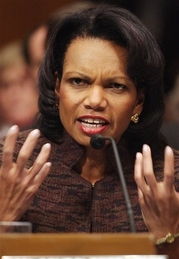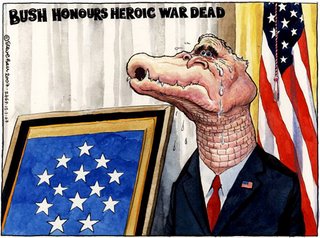A Sign of Worse Times to Come?Michael Klare of
The Nation takes a look at the recent decision to replace Gen. Abizaid as head of CentCom with Adm. Fallon from PaCom.
His analysis of what it means is gloomy and
makes perfect sense:
The choice of Fallon to replace Abizaid was highly unusual in several respects. First, this is a lateral move for the admiral, not a promotion: As head of Pacom, Fallon commanded a larger force than he will oversee at Centcom, and one over which he will exercise less direct control since all combat operations in Iraq will be under the supervision of Gen. Dave Petraeus, the recently announced replacement for Gen. George Casey as commander of all US and allied forces. Second, and more surprising, Fallon is a Navy man, with experience in carrier operations, while most of Centcom's day-to-day work is on the ground, in the struggle against insurgents and warlords in Iraq and Afghanistan.
Part of the explanation for this move, of course, is a desire by the White House to sweep away bitter ground-force commanders like Abizaid and Casey who had opposed an increase in US troops in Iraq and argued for shifting greater responsibility for the fighting to Iraq forces, thereby permitting a gradual American withdrawal. "The Baghdad situation requires more Iraqi troops," not more Americans, Abizaid said in a recent interview with the New York Times. For this alone, Abizaid had to go.
But there's more to it. Abizaid, who is of Lebanese descent and served a tour of duty with UN forces in Lebanon, has come to see the need for a regional solution to the crisis in Iraq--one that inevitably requires some sort of engagement with Iran and Syria, as recommended by the Iraq Study Group. "You have to internationalize the problem, you have to attack it diplomatically, geo-strategically," he told the Times. "You just can't apply a microscope on a particular problem in downtown Baghdad...and say that somehow or another, if you throw enough military forces at it, you are going to solve the broader issues in the region of extremism."
If engagement with Iran and Syria was even remotely on the agenda, Abizaid is exactly the man you'd want on the job at Centcom overseeing US forces and strategy in the region. But if that's not on the agenda, if you're thinking instead of using force against Iran and/or Syria, then Admiral Fallon is exactly the man you'd want at Centcom.
Why? Because combined air and naval operations are his forté. Fallon began his combat career as a Navy combat flyer in Vietnam, and he served with carrier-based forces for twenty-four years after that. He commanded a carrier battle wing during the first Gulf War in 1991 and led the naval group supporting NATO operations during the Bosnia conflict four years later. More recently, Fallon served as vice chief of naval operations before becoming the head of Pacom in 2005. All this means that he is primed to oversee an air, missile and naval attack on Iran, should the President give the green light for such an assault--and the fact that Fallon has been moved from Pacom to Centcom means that such a move is very much on Bush's mind.








